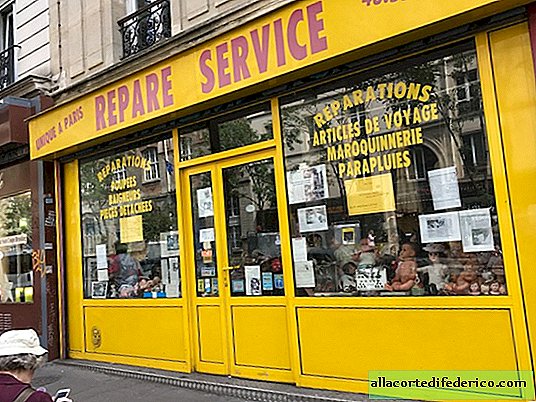Women in Iran - how to live and travel under Sharia norms
Iran is now in trend. This country, like a magnet, attracts the attention of travelers. Among those who want to visit her there are a huge number of women.
I can safely say to those who doubt that nothing threatens them in Iran. This country is safe and respects its guests. But still it is worth knowing many of the nuances and subtleties of the local rule of law, coupled with the mentality. After all, Iran is a typical eastern country with a patriarchal form of government. A woman here is not regarded as a full member of society, and there are a huge number of rules and duties that she must abide by. Many of them relate to one degree or another to travelers from other countries. Men who are planning to come here with their soul mates should also know about them.

I just traveled around this country with my wife and can share my experience. The situations were different - comical and not very. I’ll tell you more about everything. So, what may threaten patriarchy and Sharia norms ...

Iran has been living under these laws for almost 40 years. And most of the rules and restrictions apply specifically to women. Probably, almost everyone knows that the entire female population here (starting from the age of 9) is required in public places to cover his head, as well as his hands to his hands and feet ankle-deep. Men on the streets should also not notice any appetizing female forms, so it is advisable to wear long sweaters, sarafans or something like that on top of the clothes.

The colors of the clothes should be dark, ideally black. Light or bright colors are regarded as depraved. Believe me, there are practically no exceptions! This is closely watched by the morale police, which stops the unsuitably dressed women for educational conversations. Not so long ago, for violating these rules, they were given up to two years in prison. True, the attitude towards tourists is milder, but you should not neglect these standards of behavior and the obligatory dress code.
It seems to be simple and understandable. But now imagine the real picture. In Iran, air temperatures often exceed 40 degrees Celsius. The sun bakes unbearably. What it feels like to be a woman in such weather conditions does not bother anyone. The scarf can not be removed even when eating or while traveling on buses and flying on airplanes.
My wife already on the third day cursed these rules and could only relax in hotel rooms. It was necessary to see how, on the way back home, all women, without exception, threw off their shawls, which were disgusting to them, as soon as they crossed the threshold of the Turkish Airlines plane at the landing at Tehran's airport!

Further more - women in Iran must not smoke, dance or even sing songs! Only recently, Iran was allowed to use cosmetics, now local ladies come off in this regard in full. Also, women are forbidden to go to any sports. If you are a woman and love football, watch it on TV.

In general, Islam for women promotes, and very intrusively, such main virtues as humility, humility to a husband, brother or father, as well as god-fearing in everything. Ideally, a woman should not leave her home without a man at all.

To keep the female part of the population under control, it is customary here to marry their daughters from the age of 13 (until 2009, from 9 years old). A man has the right to divorce his wife at any time, while leaving the children to himself. There are no women judges in Iran, and in the case of any legal proceedings, the court will most often be on the side of men.

The woman, in turn, has the right not to work. A man is obliged to work and provide for his family. And husbands cajole their wives with rich gifts. Only here the prenuptial agreement here is not just a recommendation, but a norm of life, if you do not want one day to be completely without children and any means of livelihood.

From a young age, boys and girls study separately, the same applies to students of universities and universities. They even drive separately! In the subway, for example, cars are divided into female and male. My wife and I rode together in a man’s (this is permissible). So, closer to the center, the car was packed full of Iranians. With all the flea market, about a meter of free space remained around my wife. Touching a strange woman is a taboo that is respected even in such circumstances.

Why touch it, looking at a woman is also indecent! And if Iranians almost always enjoy posing for photographs of foreigners, not all Iranians can afford to do the same.

It seems that women here have long come to terms with this state of things, believing that they are even lucky. In Saudi Arabia, everything is much worse in this regard. At the same time, it must be recognized that women in Iran are amazingly beautiful and graceful. It is difficult to understand how they manage to maintain their charm in such conditions.

Perhaps you should know that in Iran it has not always been like this. More than two and a half millennia ago matriarchy was widespread here. Women then ruled states and engaged in trade. Islam has radically changed everything. But, when the Pahlavi dynasty came to power a little less than 100 years ago, the rules began to change.

From 1936 to 1941, the wearing of hijabs was even forbidden, and women, up to the 1980 Islamic revolution, had many rights on a par with men. But the Islamists, led by Ayatollah Khomeini, again radically changed everything.

The ideal for the entire female half of the population was declared Fatima, the daughter of the prophet Muhammad, who was distinguished by special devotion to her husband and godly fear. Men were allowed polygamy, and for treason and violation of the order of women began to be executed publicly.
Our acquaintance from Isfahan, a 26-year-old Iranian, told us that today the situation is changing. The power of religious fanatics weakened, and the youth began to allow themselves much more than before. She showed us photographs of her family on the phone, and almost always the women on them were without the notorious shawls. She herself is still not married, works as a designer of wall tiles for homes and dreams of traveling around the world. When you look at it, it begins to seem that Iran is gradually changing. True, far from as fast as we would like.

In Shiraz, my wife and I decided to go to a place very famous in Iran - the mausoleum of Shah-Cherakh. Here, more than six centuries ago, the descendants of the Prophet Muhammad - the brothers of Imam Reza, who is very revered in the Islamic world, were buried.

This complex of tombs, mosques and fountains is one of the main attractions of the city and is recommended for a must visit.

With due luck, you can get inside the tombs, where access for non-believers is closed, and see magnificent mirrored interiors. True, it can be so lucky only if you travel in a purely male company. The vigilant guard instantly grabbed us from the crowd of visitors at the entrance.

We were immediately divided, and our wife was taken away in an direction unknown to me, assuring us that we would meet inside the complex. After a very superficial inspection of my backpack, I was inside a minute later. Here I wandered aimlessly for about 15 minutes and was already beginning to worry. But soon I saw a wife, wrapped from head to toe and accompanied by a young Iranian guide.
It turns out that at the entrance she was searched and dressed by as many as three local employees. In her pockets they found (oh horror!) Cigarettes and a lighter, which were immediately thrown into the trash with contempt. Further, the guide girl did not take her eyes off us until the very exit. She also escorted my wife to the toilet. According to my wife, the sight there was also unforgettable. Dozens of holes in the floor without any partitions and a crowd of local ladies serving the need, wrapped in a veil from head to toe, it is really hard to imagine such a view.

Of course, under such conditions, one could not even think about getting inside the mausoleums.

At the end of our walk, our gracious “overseer” invited us to visit the local office for some reason. Here we were offered juice, tea and cookies. And for free! I already began to suspect - but would they like to recruit us somewhere? But everything turned out to be much more prosaic.

The girl turned on a large wall-mounted TV and, under the close attention of her grandfathers, the ayatollah began to show us photographs of the interior interiors of the tombs, the very ones where they had not allowed us. Naturally, we did not admire them, but only noticed that tourists could hardly harm this Iranian miracle ...

From this time, my wife began to be very cautious about my ideas of visiting a particular local mosque.

Honestly, it’s hard for me to explain this gender disparity in Iran. Patriarchy gives almost absolute power to men in relation to women. Someone will obviously like it. Surely there are women who will be for such foundations.
I am sure of one thing for sure! Our women should definitely visit Iran. At least in order to understand how lucky they were to be born and grow up not in Iran ...


















